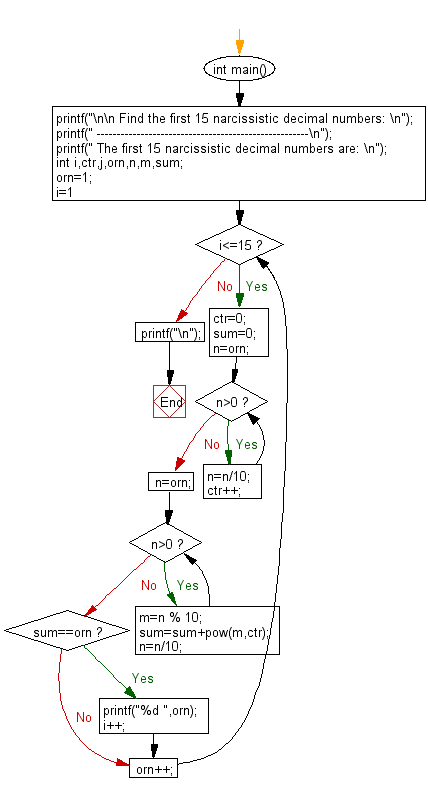C Exercises: Generate and show the first 15 narcissistic decimal numbers
C Numbers: Exercise-10 with Solution
Write a program in C to generate and show the first 15 narcissistic decimal numbers.
Sample Solution:
C Code:
# include <stdio.h>
# include <math.h>
# include <stdlib.h>
int main()
{
printf("\n\n Find the first 15 narcissistic decimal numbers: \n");
printf(" -----------------------------------------------------\n");
printf(" The first 15 narcissistic decimal numbers are: \n");
int i,ctr,j,orn,n,m,sum;
orn=1;
for (i=1;i<=15;)
{
ctr=0;
sum=0;
n=orn;
while(n>0)
{
n=n/10;
ctr++;
}
n=orn;
while(n>0)
{
m=n % 10;
sum=sum+pow(m,ctr);
n=n/10;
}
if(sum==orn)
{
printf("%d ",orn);
i++;
}
orn++;
}
printf("\n");
}
Sample Output:
The first 15 narcissistic decimal numbers are: 1 2 3 4 5 6 7 8 9 153 370 371 407 1634 8208
Pictorial Presentation:
Flowchart:

C Programming Code Editor:
Contribute your code and comments through Disqus.
Previous: Write a program in C to display and count the number of Lychrel numbers within a specific range(from 1 to a specific upper limit).
Next: Write a program in C to display the first 10 lucus numbers.
What is the difficulty level of this exercise?
Test your Programming skills with w3resource's quiz.
C Programming: Tips of the Day
Static variable inside of a function in C
The scope of variable is where the variable name can be seen. Here, x is visible only inside function foo().
The lifetime of a variable is the period over which it exists. If x were defined without the keyword static, the lifetime would be from the entry into foo() to the return from foo(); so it would be re-initialized to 5 on every call.
The keyword static acts to extend the lifetime of a variable to the lifetime of the programme; e.g. initialization occurs once and once only and then the variable retains its value - whatever it has come to be - over all future calls to foo().
Ref : https://bit.ly/3fOq7XP
- New Content published on w3resource:
- HTML-CSS Practical: Exercises, Practice, Solution
- Java Regular Expression: Exercises, Practice, Solution
- Scala Programming Exercises, Practice, Solution
- Python Itertools exercises
- Python Numpy exercises
- Python GeoPy Package exercises
- Python Pandas exercises
- Python nltk exercises
- Python BeautifulSoup exercises
- Form Template
- Composer - PHP Package Manager
- PHPUnit - PHP Testing
- Laravel - PHP Framework
- Angular - JavaScript Framework
- Vue - JavaScript Framework
- Jest - JavaScript Testing Framework
